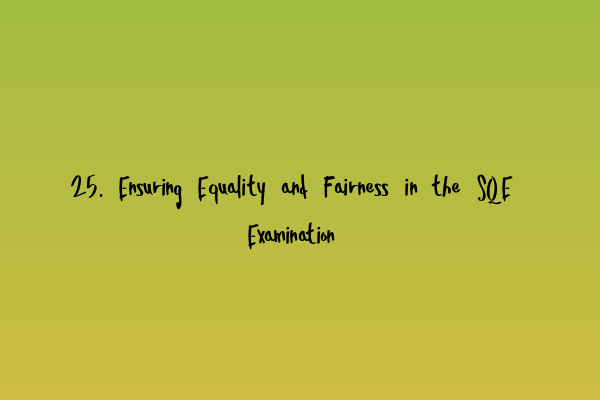25. Ensuring Equality and Fairness in the SQE Examination
As the SQE (Solicitors Qualifying Examination) becomes the new standardized assessment for aspiring solicitors, it is crucial to ensure equality and fairness in the examination process. The SQE aims to create a level playing field for all candidates, regardless of their background or circumstances, and promote diversity within the legal profession. In this article, we will explore the various measures taken to achieve this goal and how they contribute to a fair and inclusive examination experience.
One of the key aspects of ensuring equality and fairness in the SQE is the grading system. Understanding how the grading system works is essential for candidates, as it provides transparency and clarity regarding their performance in the examination. For a comprehensive guide on the SQE grading system, check out our article on Understanding the Grading System in SQE.
1. Non-Discriminatory Content
In developing the SQE syllabus, the Solicitors Regulation Authority (SRA) has taken significant measures to ensure that the examination content does not discriminate against any particular group of candidates. The content is designed to be inclusive and representative of the actual legal practice, avoiding any biases or stereotypes. This approach ensures that the examination assesses candidates’ legal knowledge and skills objectively. For more information on the SRA syllabus, read our article on Unveiling the SRA Syllabus for the SQE.
2. Reasonable Adjustments for Disabilities
The SQE recognizes the importance of providing reasonable adjustments to candidates with disabilities or additional needs. This ensures that all candidates have an equal opportunity to perform at their best. The SRA has established a clear process for candidates to request reasonable adjustments, which is assessed on an individual basis. These adjustments could include additional time, modified assessment materials, or assistive technology. It is important for candidates to be aware of their rights and the process involved in applying for reasonable adjustments. For more guidance, consult our article on Review of SQE Course Providers: Choosing the Best Fit.
3. Standardized Marking and Moderation
To maintain fairness and consistency in marking, the SQE follows a rigorous process of standardized marking and moderation. This is crucial in ensuring that all candidates are assessed against the same criteria and that marking is not influenced by personal biases. The standardized marking process involves trained examiners who adhere to specific marking guidelines. Additionally, the moderation process reviews a sample of scripts to ensure that marking is accurate and uniform. Candidates can have confidence that their performance is assessed fairly, without any discrimination or favoritism.
4. Anonymous Assessments
The SQE examination is conducted anonymously, meaning that the examiners do not have access to candidates’ personal details or background information during the marking process. This anonymity removes any potential biases that may arise based on a candidate’s identity, educational institution, or background. As a result, candidates are evaluated solely on their ability to demonstrate the required legal knowledge and skills. This practice promotes equality and prevents any unconscious biases from impacting the assessment outcome.
5. Diversity in Assessment Methods
Recognizing that candidates may have different learning styles and strengths, the SQE incorporates a variety of assessment methods to ensure diversity and inclusivity. The examination includes both written and oral assessments, practical scenarios, and multiple-choice questions. This approach ensures that candidates with different strengths and backgrounds have an equal opportunity to demonstrate their legal knowledge and skills. Candidates can prepare for the diverse assessment methods by accessing our informative webinars at SQE Webinars: Expert Insights at Your Fingertips.
In conclusion, equality and fairness are integral to the SQE examination. Through non-discriminatory content, reasonable adjustments for candidates with disabilities, standardized marking and moderation, anonymous assessments, and diversity in assessment methods, the SQE strives to create an inclusive and level playing field for all aspiring solicitors. By embracing these measures, we can ensure that the legal profession reflects the diversity of society and promotes equal opportunities for all.
For more tips and tricks to succeed in the SQE, don’t miss our article on Conquer the SQE: Insider Tips and Study Tricks for Success.
